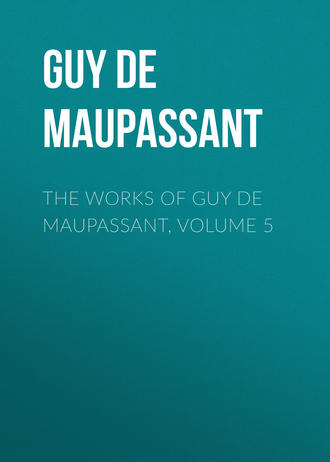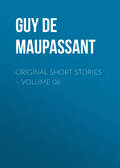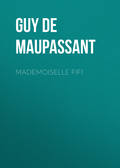
Ги де Мопассан
The works of Guy de Maupassant, Volume 5
He rose up, swallowed a glass of wine and sat down again.
He thought.
"What am I to do if this come back?"
And it did come back; he felt it; he was sure of it. Already his glance was drawn towards the window; it called him; it attracted him. In order to avoid looking at it, he turned aside his chair. Then he took a book and tried to read; but it seemed to him that he presently heard something stirring behind him, and he swung round his armchair on one foot.
The curtain still moved – unquestionably, it did move this time; he could no longer have any doubt about it.
He rushed forward and seized it in his grasp so violently that he knocked it down with its fastener. Then, he eagerly pasted his face against the glass. He saw nothing. All was black without; and he breathed with the delight of a man whose life has just been saved.
Then, he went back to his chair, and sat down again; but almost immediately he felt a longing once more to look out through the window. Since the curtain had fallen the space in front of him made a sort of dark patch fascinating and terrible on the obscure landscape. In order not to yield to this dangerous temptation, he took off his clothes, blew out the light, went to bed, and shut his eyes.
Lying on his back motionless, his skin hot and moist, he awaited sleep. Suddenly a great gleam of light flashed across his eyelids. He opened them, believing that his dwelling was on fire. All was black as before, and he leaned on his elbow in order to try to distinguish his window which had still for him an unconquerable attraction. By dint of straining his eyes, he could perceive some stars, and he arose, groped his way across the room, discovered the panes with his outstretched hands, and placed his forehead close to them. There below, under the trees, the body of the little girl glittered like phosphorus, lighting up the surrounding darkness.
Renardet uttered a cry and rushed towards his bed, where he lay till morning, his head hidden under the pillow.
From that moment, his life became intolerable. He passed his days in apprehension of each succeeding night; and each night the vision came back again. As soon as he had locked himself up in his room, he strove to struggle; but in vain. An irresistible force lifted him up and pushed him against the glass, as if to call the phantom, and ere long he saw it lying at first in the spot where the crime was committed, lying with arms and legs outspread, just in the way the body had been found.
Then the dead girl rose up and came towards him with little steps just as the child had done when she came out of the river. She advanced quietly, passing straight across the grass, and over the border of withered flowers. Then she rose up into the air towards Renardet's window. She came towards him, as she had come on the day of the crime towards the murderer. And the man recoiled before the apparition – he retreated to his bed and sank down upon it, knowing well that the little one had entered the room, and that she now was standing behind the curtain which presently moved. And until daybreak, he kept staring at this curtain, with a fixed glance, ever waiting to see his victim depart.
But she did not show herself any more; she remained there behind the curtain which quivered tremulously now and then.
And Renardet, his fingers clinging to the bedclothes, squeezed them as he had squeezed the throat of little Louise Roqué.
He heard the clock striking the hours; and in the stillness the pendulum kept ticking in time with the loud beatings of his heart. And he suffered, the wretched man, more than any man had ever suffered before.
Then, as soon as a white streak of light on the ceiling announced the approaching day, he felt himself free, alone, at last, alone in his room; and at last he went to sleep. He slept then some hours – a restless, feverish sleep in which he retraced in dreams the horrible vision of the night just past.
When, later on, he went down to breakfast, he felt doubled up as if after prodigious fatigues; and he scarcely ate anything, still haunted as he was by the fear of what he had seen the night before.
He knew well, however, that it was not an apparition, that the dead do not come back, and that his sick soul, his soul possessed by one thought alone, by an indelible remembrance, was the only cause of his punishment, the only evoker of the dead girl brought back by it to life, called up by it and raised by it before his eyes in which the ineffaceable image remained imprinted. But he knew, too, that he could not cure it, that he would never escape from the savage persecution of his memory; and he resolved to die, rather than to endure these tortures any longer.
Then, he thought of how he would kill himself. He wished for something simple and natural, which would preclude the idea of suicide. For he clung to his reputation, to the names bequeathed to him by his ancestors; and if there were any suspicion as the cause of his death, people's thoughts might be perhaps directed towards the mysterious crime, towards the murderer who could not be found, and they would not hesitate to accuse him of the crime.
A strange idea came into his head, that of getting himself crushed by the tree at the foot of which he had assassinated little Louise Roqué. So he determined to have his wood cut down, and to simulate an accident. But the beech-tree refused to smash his ribs.
Returning to his house, a prey to utter despair he had snatched up his revolver, and then he did not dare to fire it.
The dinner bell summoned him. He could eat nothing, and then he went up-stairs again. And he did not know what he was going to do. Now that he had escaped the first time, he felt himself a coward. Presently, he would be ready, fortified, decided, master of his courage and of his resolution; now, he was weak and feared death as much as he did the dead girl.
He faltered:
"I will not venture it again – I will not venture it."
Then he glanced with terror, first at the revolver on the table, and next at the curtain which hid his window. It seemed to him, moreover that something horrible would occur as soon as his life was ended. Something? What? A meeting with her perhaps. She was watching for him; she was waiting for him; she was calling him; and her object was to seize him in her turn, to draw him towards the doom that would avenge her, and to lead him to die so that she might exhibit herself thus every night.
He began to cry like a child, repeating:
"I will not venture it again – I will not venture it."
Then, he fell on his knees, and murmured:
"My God! my God!" without believing, nevertheless, in God. And he no longer dared, in fact, to look out through his window where he knew the apparition was visible nor at his table where his revolver gleamed.
When he had risen up, he said:
"This cannot last; there must be an end of it."
The sound of his voice in the silent room made a shiver of fear pass through his limbs, but, as he could not bring himself to come to a determination as he felt certain that his finger would always refuse to pull the trigger of his revolver, he turned round to hide his head under the bedclothes, and plunged into reflection.
He would have to find some way in which he could force himself to die, to invent some device against himself, which would not permit of any hesitation on his part, any delay, any possible regrets. He envied condemned criminals who are led to the scaffold surrounded by soldiers. Oh! if he could only beg of some one to shoot him; if he could, confessing the state of his soul, confessing his crime to a sure friend who would never divulge it, obtain from him death.
But from whom could he ask this terrible service? From whom? He cast about in his thoughts among his friends whom he knew intimately. The doctor? No, he would talk about it afterwards, most certainly. And suddenly a fantastic idea entered his mind. He would write to the examining magistrate, who was on terms of close friendship with him and would denounce himself as the perpetrator of the crime. He would in this letter confess everything, revealing how his soul had been tortured, how he had resolved to die, how he had hesitated about carrying out his resolution, and what means he had employed to strengthen his failing courage. And in the name of their old friendship he would implore of the other to destroy the letter as soon as he had ascertained that the culprit had inflicted justice on himself. Renardet might rely on this magistrate, he knew him to be sure, discreet, incapable of even an idle word. He was one of those men who have an inflexible conscience governed, directed, regulated by their reason alone.
Scarcely had he formed this project when a strange feeling of joy took possession of his heart. He was calm now. He would write his letter slowly, then at daybreak he would deposit it in the box nailed to the wall in his office, then he would ascend his tower to watch for the postman's arrival, and when the man in the blue blouse showed himself, he would cast himself head foremost on the rocks on which the foundations rested. He would take care to be seen first by the workmen who had cut down his wood. He could then climb to the step some distance up which bore the flag staff displayed on fête days. He would smash this pole with a shake and precipitate it along with him.
Who would suspect that it was not an accident? And he would be killed completely, having regard to his weight and the height of the tower.
Presently he got out of bed, went over to the table, and began to write. He omitted nothing, not a single detail of the crime, not a single detail of the torments of his heart, and he ended by announcing that he had passed sentence on himself, that he was going to execute the criminal, and begging of his friend, his old friend, to be careful that there should never be any stain on his memory.
When he had finished his letter, he saw that the day had dawned.
He closed and sealed it, wrote the address; then he descended with light steps, hurried towards the little white box fastened to the wall in the corner of the farm-house, and when he had thrown into it the paper which made his hand tremble, he came back quickly, shut the bolts of the great door, and climbed up to his tower to wait for the passing of the postman, who would convey his death sentence.
He felt self-possessed, now. Liberated! Saved!
A cold dry wind, an icy wind, passed across his face. He inhaled it eagerly, with open mouth, drinking in its chilling kiss. The sky was red, with a burning red, the red of winter, and all the plain whitened with frost glistened under the first rays of the sun, as if it had been powdered with bruised glass.
Renardet, standing up, with his head bare, gazed at the vast tract of country before him, the meadow to the left, and to the right the village whose chimneys were beginning to smoke with the preparations for the morning meal. At his feet he saw the Brindelle flowing towards the rocks, where he would soon be crushed to death. He felt himself reborn on that beautiful frosty morning, full of strength, full of life. The light bathed him, penetrated him like a new-born hope. A thousand recollections assailed him, recollections of similar mornings, of rapid walks on the hard earth which rang under his footsteps, of happy chases on the edges of pools where wild ducks sleep. All the good things that he loved, the good things of existence rushed into memory, penetrated him with fresh desires, awakened all the vigorous appetites of his active, powerful body.
And he was about to die? Why? He was going to kill himself stupidly, because he was afraid of a shadow – afraid of nothing? He was still rich and in the prime of life! What folly! But all he wanted was distraction, absence, a voyage in order to forget.
This night even he had not seen the little girl because his mind was preoccupied, and so had wandered towards some other subject. Perhaps he would not see her any more? And even if she still haunted him in this house, certainly she would not follow him elsewhere! The earth was wide, the future was long.
Why die?
His glance traveled across the meadows, and he perceived a blue spot in the path which wound alongside the Brindelle. It was Mederic coming to bring letters from the town and to carry away those of the village.
Renardet got a start, a sensation of pain shot through his breast, and he rushed towards the winding staircase to get back his letter, to demand it back from the postman. Little did it matter to him now whether he was seen. He hurried across the grass moistened by the light frost of the previous night, and he arrived in front of the box in the corner of the farm-house exactly at the same time as the letter carrier.
The latter had opened the little wooden door, and drew forth the four papers deposited there by the inhabitants of the locality.
Renardet said to him:
"Good morrow, Mederic."
"Good morrow, M'sieu le Maire."
"I say, Mederic, I threw a letter into the box that I want back again. I came to ask you to give it back to me."
"That's all right, M'sieur le Maire – you'll get it."
And the postman raised his eyes. He stood petrified at the sight of Renardet's face. The Mayor's cheeks were purple, his eyes were glaring with black circles round them as if they were sunk in his head, his hair was all tangled, his beard untrimmed, his necktie unfastened. It was evident that he had not gone to bed.
The postman asked:
"Are you ill, M'sieur le Maire?"
The other, suddenly comprehending that his appearance must be unusual, lost countenance, and faltered —
"Oh! no – oh! no. Only I jumped out of bed to ask you for this letter. I was asleep. You understand?"
He said in reply:
"What letter?"
"The one you are going to give back to me."
Mederic now began to hesitate. The Mayor's attitude did not strike him as natural. There was perhaps a secret in that letter, a political secret. He knew Renardet was not a Republican, and he knew all the tricks and chicaneries employed at elections.
He asked:
"To whom is it addressed, this letter of yours?"
"To M. Putoin, the examining magistrate – you know my friend, M. Putoin, well!"
The postman searched through the papers, and found the one asked for. Then he began looking at it, turning it round and round between his fingers, much perplexed, much troubled by the fear of committing a grave offense or of making an enemy for himself of the Mayor.
Seeing his hesitation, Renardet made a movement for the purpose of seizing the letter and snatching it away from him. This abrupt action convinced Mederic that some important secret was at stake and made him resolve to do his duty, cost what it may.
So he flung the letter into his bag and fastened it up, with the reply:
"No, I can't, M'sieur le Maire. From the moment it goes to the magistrate, I can't."
A dreadful pang wrung Renardet's heart, and he murmured:
"Why, you know me well. You are even able to recognize my handwriting. I tell you I want that paper."
"I can't."
"Look here, Mederic, you know that I'm incapable of deceiving you – I tell you I want it."
"No, I can't."
A tremor of rage passed through Renardet's soul.
"Damn it all, take care! You know that I don't go in for chaffing, and that I could get you out of your job, my good fellow, and without much delay either. And then, I am the Mayor of the district, after all; and I now order you to give me back that paper."
The postman answered firmly:
"No, I can't, M'sieur le Maire."
Thereupon, Renardet, losing his head, caught hold of the postman's arms in order to take away his bag; but, freeing himself by a strong effort, and springing backwards, the letter carrier raised his big holly stick. Without losing his temper, he said emphatically:
"Don't touch me, M'sieur le Maire, or I'll strike. Take care, I'm only doing my duty!"
Feeling that he was lost, Renardet suddenly became humble, gentle, appealing to him like a crying child:
"Look here, look here, my friend, give me back that letter, and I'll recompense you – I'll give you money. Stop! Stop! I'll give you a hundred francs, you understand – a hundred francs!"
The postman turned on his heel and started on his journey.
Renardet followed him, out of breath, faltering:
"Mederic, Mederic, listen! I'll give you a thousand francs, you understand – a thousand francs."
The postman still went on without giving any answer.
Renardet went on:
"I'll make your fortune, you understand – whatever you wish – fifty thousand francs – fifty thousand francs for that letter! What does it matter to you? You won't? Well, a hundred thousand – I say – a hundred thousand francs. Do you understand? A hundred thousand francs – a hundred thousand francs."
The postman turned back, his face hard, his eye severe:
"Enough of this, or else I'll repeat to the magistrate everything you have just said to me."
Renardet stopped abruptly. It was all over. He turned back and rushed towards his house, running like a hunted animal.
Then, in his turn, Mederic stopped, and watched this flight with stupefaction. He saw the Mayor re-entering his own house, and he waited still as if something astonishing was about to happen.
In fact, presently the tall form of Renardet appeared on the summit of the Fox's tower. He ran round the platform, like a madman. Then he seized the flagstaff and shook it furiously without succeeding in breaking it, then, all of a sudden, like a swimmer taking a plunge, he dashed into the air with his two hands in front of him.
Mederic rushed forward to give succor. As he crossed the park, he saw the woodcutters going to work. He called out to them telling them an accident had occurred, and at the foot of the walls they found a bleeding body the head of which was crushed on a rock. The Brindelle surrounded this rock, and over its clear, calm waters, swollen at this point, could be seen a long red stream of mingled brains and blood.
MOTHER AND DAUGHTER
"The Comtesse Samoris."
"That lady in black over there?"
"The very one. She's wearing mourning for her daughter, whom she killed."
"Come now! You don't mean that seriously?"
"Oh! it is a very simple story, without any crime in it, any violence."
"Then what really happened?"
"Almost nothing. Many courtesans were born to be virtuous women, they say; and many women called virtuous were born to be courtesans – is that not so? Now, Madame Samoris, who was born a courtesan, had a daughter born a virtuous woman, that's all."
"I don't quite understand you."
"I'll explain what I mean. The Comtesse Samoris is one of those tinsel foreign women hundreds of whom are rained down every year on Paris. A Hungarian or Wallachian countess, or I know not what, she appeared one winter in apartments she had taken in the Champs Elysees, that quarter for adventurers and adventuresses, and opened her drawing-room to the first comer or to anyone that turned up.
"I went there. Why? you will say. I really can't tell you. I went there, as everyone goes to such places because the women are facile and the men are dishonest. You know that set composed of filibusters with varied decorations, all noble, all titled, all unknown at the embassies, with the exception of those who are spies. All talk of their honor without the slightest occasion for doing so, boast of their ancestors, tell you about their lives, braggarts, liars, sharpers, as dangerous as the false cards they have up their sleeves, as delusive as their name – in short, the aristocracy of the bagnio.
"I adore these people. They are interesting to study, interesting to know, amusing to understand, often clever, never commonplace like public functionaries. Their wives are always pretty, with a slight flavor of foreign roguery, with the mystery of their existence, half of it perhaps spent in a house of correction. They have, as a rule, magnificent eyes and incredible hair. I adore them also.
"Madame Samoris is the type of these adventuresses, elegant, mature, and still beautiful. Charming feline creatures, you feel that they are vicious to the marrow of their bones. You find them very amusing when you visit them; they give card-parties; they have dances and suppers; in short, they offer you all the pleasures of social life.
"And she had a daughter – a tall, fine-looking girl, always ready for entertainments, always full of laughter and reckless gayety – a true adventuress's daughter – but, at the same time, an innocent, unsophisticated, artless girl, who saw nothing, knew nothing, understood nothing of all the things that happened in her father's house."
"How do you know about him?"
"How do I know? That's the funniest part of the business! One morning, there was a ring at my door, and my valet came up to tell me that M. Joseph Bonenthal wanted to speak to me. I said directly: 'And who is this gentleman?' My valet replied: 'I don't know, monsieur; perhaps 'tis someone that wants employment.' And so it was. The man wanted me to take him as a servant. I asked him where he had been last. He answered: 'With the Comtesse Samoris.' 'Ah!' said I, 'but my house is not a bit like hers.' 'I know that well, monsieur,' he said, 'and that's the very reason I want to take service with monsieur. I've had enough of these people: a man may stay a little while with them, but he won't remain long with them.' I required an additional man servant at the time, and so I took him.
"A month later, Mademoiselle Yveline Samoris died mysteriously, and here are all the details of her death I could gather from Joseph, who got them from his sweetheart, the Comtesse's chambermaid:
"It was a ball-night, and two newly-arrived guests were chatting behind a door. Mademoiselle Yveline, who had just been dancing, leaned against this door to get a little air.
"They did not see her approaching; but she heard what they were saying. And this was what they said:
"'But who is the father of the girl?'
"'A Russian, it appears, Count Rouvaloff. He never comes near the mother now.'
"'And who is the reigning prince to-day?'
"'That English prince standing near the window; Madame Samoris adores him. But her adoration of anyone never lasts longer than a month or six weeks. Nevertheless, as you see, she has a large circle of admirers. All are called – and nearly all are chosen. That kind of thing costs a good deal, but – hang it, what can you expect?'
"'And where did she get this name of Samoris?'
"'From the only man perhaps that she ever loved – a Jewish banker from Berlin who goes by the name of Samuel Morris.'
"'Good. Thanks. Now that I know all about her, and see her sort, I'm off!'
"What a start there was in the brain of the young girl endowed with all the instincts of a virtuous woman! What despair overwhelmed that simple soul! What mental tortures quenched her endless gayety, her delightful laughter, her exulting satisfaction with life! What a conflict took place in that youthful heart up to the moment when the last guest had left! Those were things that Joseph could not tell me. But, the same night, Yveline abruptly entered her mother's room just as the Comtesse was getting into bed, sent out the waiting-maid, who was close to the door, and, standing erect and pale, and with great staring eyes, she said:
"'Mamma, listen to what I heard a little while ago during the ball.'
"And she repeated word for word the conversation just as I told it to you.
"The Comtesse was so stupefied that she did not know what to say in reply, at first. When she recovered her self-possession, she denied everything, and called God to witness that there was no truth in the story.
"The young girl went away, distracted but not convinced. And she watched her mother.
"I remember distinctly the strange alteration that then took place in her. She was always grave and melancholy. She used to fix on us her great earnest eyes as if she wanted to read what was at the bottom of our hearts. We did not know what to think of her, and we used to maintain that she was looking out for a husband.
"One evening her doubts were dispelled. She caught her mother with a lover. Thereupon she said coldly, like a man of business laying down the terms of an agreement:
"'Here is what I have determined to do, mamma: We will both go away to some little town – or rather into the country. We will live there quietly as well as we can. Your jewelry alone may be called a fortune. If you wish to marry some honest man, so much the better; still better will it be if I can find one. If you don't consent to do this, I will kill myself.'
"This time, the Comtesse ordered her daughter to go to bed, and never to administer again this lecture so unbecoming in the mouth of a child towards her mother.
"Yveline's answer to this was: 'I give you a month to reflect. If, at the end of that month, we have not changed our way of living, I will kill myself, since there is no other honorable issue left to my life.'
"Then she took herself off.
"At the end of a month, the Comtesse Samoris was giving balls and suppers just the same as ever. Yveline then, under the pretext that she had a bad toothache purchased a few drops of chloroform from a neighboring chemist. The next day she purchased more; and, every time she went out, she managed to procure small doses of the narcotic. She filled a bottle with it.
"One morning she was found in bed, lifeless, and already quite cold, with a cotton mask over her face.
"Her coffin was covered with flowers, the church was hung in white. There was a large crowd at the funeral ceremony.
"Ah! well, if I had known – but you never can know – I would have married that girl, for she was infernally pretty."
"And what became of the mother?"
"Oh! she shed a lot of tears over it. She has only begun to receive visits again for the past week."
"And what explanation is given of the girl's death?"
"Oh! 'tis pretended that it was an accident caused by a new stove, the mechanism of which got out of order. As a good many such accidents have happened, the thing looks probable enough."







